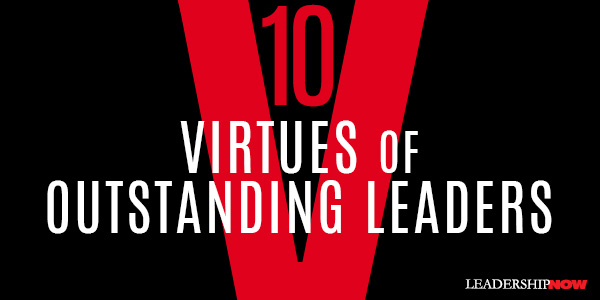 |
 |
06.13.13

The Ten Virtues of Outstanding Leaders
LEADERSHIP and character are inseparable. In the Ten Virtues of Outstanding Leaders, philosophers Al Gini and Ronald Green, ask what is good leadership? They insist "that ethics, character, and virtue are essential to real leadership" and anything else is misleadership. They define leadership as: Leadership is not just a set of learned skills, a series of outcomes, a career, a profession, or a title. Leadership, at its core, is about character: specifically, a character attuned to its ethical responsibilities to others. The kind of character that, in regard to others, always tries to do the right thing, for the right reason, on purpose. They suggest ten virtues or traits of character and as such they describe not just a leader's behavior but a clear sense of the way a leader thinks; the beliefs and motivations behind their actions. They note that these virtues are fragmentary in that they can exist apart from one another and rarely does any leader possess all of them. 1. Deep Honesty. Not just truth-telling but a bias for the truth. "It describes the leader's basic commitment to the truth, and a sense of shame or anger when deceitfulness replaces truth-telling." (James Burke, Johnson & Johnson) 2. Moral Courage. "Here one confronts a multitude of things that terrify people: fear of criticism or embarrassment; fear of poverty or job loss; fear of losing friends or being ostracized—even fear of being seen to be in the wrong. Overcoming self-doubt can be an expression of courage." Courageous leaders hold fast to their values and purpose even when there is no certainty that they will prevail. Courage is of particular importance because unlike the virtue of honesty, is not an aim in itself but it supports other moral claims. As such, philosopher Robert Merrihew Adams describes courage as a "structural virtue." (Abraham Lincoln and Rosa Parks) 3. Moral Vision. Great leaders not only "exhibit moral courage, they are also able to understand the meaning of the values they fight for and the importance of ethics in both human life and in the life of organizations and communities." They understand the consequences of ethical values and are able to share it with others. (Winston Churchill) 4. Compassion and Care. The ability to connect with and resonate to the needs of their followers. Leadership is a relationship. (Oprah Winfrey) 5. Fairness. Leaders should be fair in executing policies across the board. Fairness reinforces followers' trust. Everyone is special but not different. (Dwight D. Eisenhower) 7. Creative Thinking. A tendency toward independence and creativity in thinking. It may show itself "in new ways of accomplishing organizational goals, and even of redefining those goals." In periods of great change a "premium is placed on leaders who can come up with original solutions or approaches." (Herb Kelleher) 8. Aesthetic Sensitivity. This virtue is not just an appreciation of the creation of beauty, but an ability to leverage it for the organizations advantage. "By paying attention to the aesthetic dimensions of their enterprise, outstanding leaders pioneer new products and services and actively shape the tastes of millions." (Steve Jobs) 9. Good Timing. This, like courage, is another structural virtue. It is necessary for the pursuit of any worthy goal. "Like deep honesty, good timing defies superficial outer appraisal. A leader who waits the precise moment to act may appear indecisive to those who urge a quicker response. Such a leader must also have the courage to weather criticisms." (Charles de Gaulle) 10. Deep Selflessness. The willingness to sacrifice oneself. In moments of great organizational uncertainty or crisis, a leader's self-sacrifice "could send a clear message as to what kind of conduct is needed to overcome the crisis and how earnestly the leader is committed to the cause of the organization. It conveys to followers the leader's strong conviction that 'we can do it,' and is an earnest invitation to participate." (Martin Luther King Jr.) In the second part of the book they explore the meaning of each of these virtues through the lives of leaders that lived and exemplified them. "Virtue is learned," write Gini and Green, "by witnessing the deeds of others." 
Posted by Michael McKinney at 11:33 PM
|
BUILD YOUR KNOWLEDGE
 

How to Do Your Start-Up Right STRAIGHT TALK FOR START-UPS 
Grow Your Leadership Skills NEW AND UPCOMING LEADERSHIP BOOKS 
Leadership Minute BITE-SIZE CONCEPTS YOU CAN CHEW ON 
Classic Leadership Books BOOKS TO READ BEFORE YOU LEAD |